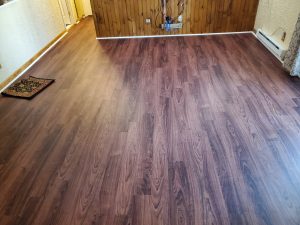Navigating the Commercial Flooring Maze: A Comprehensive Guide


When it comes to commercial flooring, the choices can be overwhelming. Your selection of flooring not only impacts the aesthetics of your business space but influences functionality, maintenance, and even safety. Whether you’re setting up a new business, giving your office a makeover, or simply considering an upgrade, selecting the right commercial flooring is a decision that warrants careful consideration. In this guide, we’ll walk you through the essential steps to help you choose the perfect commercial flooring solution for your specific needs.
Understand Your Business Needs
Before you start browsing flooring options, it’s crucial to understand your business’s unique requirements. The type of business you operate, the amount of foot traffic your space sees, and your maintenance capabilities all play a significant role in your decision-making process.
Foot Traffic: Evaluate the level of foot traffic in your space. High-traffic areas, such as retail stores and healthcare facilities, need durable flooring that can withstand constant use.
Maintenance: Consider your maintenance budget and staff capabilities. Some flooring materials require more frequent and specialized maintenance than others.
Aesthetics: Consider the image you want to project to customers. The style and aesthetics of your commercial flooring should align with your brand and business image.
Budget: Determine your budget for flooring. Being clear about your financial constraints will help you narrow your choices and avoid overspending.
Types of Commercial Flooring
The world of commercial flooring offers diverse options, each with its own set of benefits and characteristics. Here are some popular types:
Vinyl Flooring: Vinyl flooring comes in various forms, including vinyl plank and tile. It’s known for its versatility, durability, ease of maintenance, and cost-effectiveness.
Carpet: Carpet provides comfort and sound absorption, making it ideal for office spaces. However, there are better choices for high-traffic areas due to their susceptibility to stains and wear.
Hardwood Flooring: Hardwood flooring exudes elegance and warmth. It suits upscale businesses but may require more care to prevent scratches and water damage.
Tile Flooring: Tiles, such as ceramic and porcelain, are durable and moisture-resistant, making them suitable for kitchens, bathrooms, and spill-prone areas.
Concrete Flooring: Polished concrete offers a modern, sleek appearance and is easy to clean. It’s highly durable and customizable with various finishes.
Laminate Flooring: Laminate mimics the look of hardwood or stone at a lower cost. It’s durable and resistant to stains and scratches.
Rubber Flooring: Rubber flooring is ideal for gyms, healthcare facilities, and industrial spaces, thanks to its shock absorption and slip resistance.
Durability and Maintenance
Durability and maintenance requirements are paramount when choosing commercial flooring. High-traffic areas need robust flooring that can withstand heavy use, while low-maintenance options are preferable for businesses with limited cleaning resources.
Vinyl, laminate, and concrete flooring are renowned for their durability and ease of maintenance. They can handle heavy foot traffic and resist stains and moisture. However, carpet and hardwood may require more frequent care and may not be suitable for high-wear areas.
Aesthetics and Branding
Your flooring should align with your brand and create the desired atmosphere for your customers and employees. Consider color, pattern, and texture, ensuring they complement your interior design.
For instance, a tech startup might opt for a modern, minimalist look, while a café or boutique could aim for a cozy, inviting atmosphere.
Safety Concerns
Safety should never be compromised when selecting commercial flooring, especially in spaces where slip and fall accidents can occur. Ensure your chosen flooring material offers adequate slip resistance. Rubber and non-slip tiles are excellent options for safety-conscious businesses.
Additionally, consider the flooring’s impact on indoor air quality. Some materials, such as carpets, may trap allergens, necessitating more rigorous cleaning.
Budget Constraints
Budget plays a vital role in your flooring decision. While opting for the lowest-cost option is tempting, consider the long-term benefits of investing in higher-quality flooring. Such investments often reduce repair and replacement costs in the future.
Obtain quotes from multiple suppliers and calculate the lifetime cost, including installation and maintenance, to make an informed decision that aligns with your budget.
Installation and Warranty
Proper installation is crucial to ensure the longevity and performance of your commercial flooring. Hire experienced professionals familiar with commercial projects for the installation process.
Additionally, inquire about warranties and guarantees offered by the manufacturer and installer. A contract can provide peace of mind and protection against unexpected issues.
Choosing the perfect commercial flooring may seem daunting, but carefully considering your business’s specific needs, budget, aesthetics, and safety concerns, you can make an informed decision. Remember that investing in high-quality flooring enhances your business space, reduces maintenance costs, and ensures a long-lasting, attractive appearance for your customers and employees. Take your time, explore your options, and transform your business space into a functional and visually appealing environment that reflects your brand’s identity.
